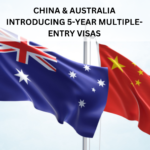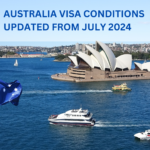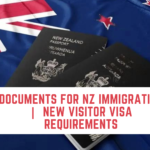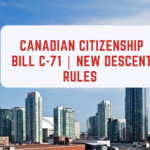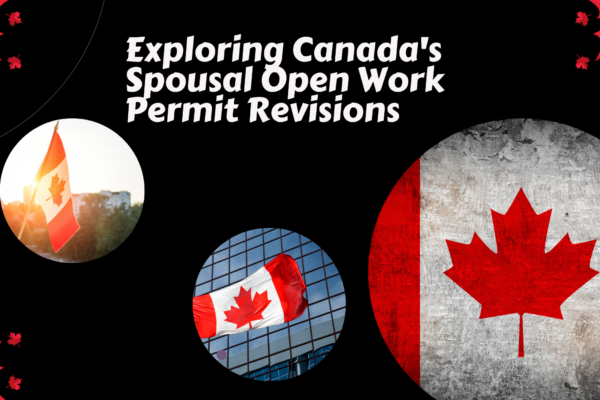
Spousal Open Work Permit Eligibility | IRCC
Recent modifications to the eligibility requirements for Spousal Open Work Permits (SOWP) were released by Immigration, Refugees, and Citizenship Canada (IRCC), marking a significant shift in policy that will affect immigration dynamics in Canada. These modifications, which take effect on January 22, 2024, bring about some significant revisions, especially for spouses of foreign students studying in the nation. Considering the IRCC Updates | Spousal Open Work Permit When it comes to Spousal Open Work Permits, the most recent changes that the IRCC has released mark a significant divergence from earlier standards. Spouses of foreign students enrolling in master’s or doctorate programs at accredited Canadian universities or polytechnic institutions will be the only ones eligible for SOWPs as of March 19, 2024. This change is a break from previous policies that allowed spouses of college- and undergraduate-level students to apply. Examining Exemptions and Particular Situations Although the general regulation appears to bar spouses of undergraduate students from being eligible for a Spousal Open Work Permit (SOWP), there are specific exceptions that apply to people enrolled in specific professional degree programs. These exclusions provide a route for spouses of undergraduate students who want to pursue fields that are important in both the academic and professional domains. Professional degree programs in Dentistry, Law, Medicine, Optometry, Pharmacy, Veterinary Medicine, Nursing, Education, and Engineering fall under the category of programs for which SOWPs are eligible. The acknowledgement of these specialist fields recognizes their importance in society and the labor market, notwithstanding the general exclusion framework. By granting eligibility to partners of undergraduate students studying in these prestigious subjects, the IRCC recognizes the special conditions associated with these kinds of academic endeavors. These fields not only provide important contributions to the professional and intellectual landscape, but they also highlight how important it is to develop skill and knowledge in vital areas of the Canadian economy. By using this customized strategy, the IRCC makes sure that worthy people who are essential to the development of these important disciplines can find work through(Spousal Open Work Permit) SOWPs. This award highlights the government’s dedication to helping qualified workers enter the Canadian workforce and enhancing the country’s intellectual, professional, and social fabric. Navigating the Application Process Careful documentation is essential for partners and spouses hoping to apply for a Spousal Open Work Permit. Candidates must provide convincing documentation of their link to the student as well as evidence that the student is enrolled in a course of study leading to a degree. A current Letter of Acceptance (LOA) from a Designated Learning Institution (DLI), an enrollment confirmation letter from the student’s DLI, or transcripts from the student’s current course of study are examples of acceptable documentation. Spousal Open Work Permit Application Guide – IRCC Insights for Existing Applicants Before the updated standards went into effect on March 19, 2024, applicants for the SOWP were still eligible under certain restrictions. In order to meet the eligibility requirements, the sponsoring partner needs to have a current study permit, be qualified for a post-graduation work permit (PGWP), or continue to be enrolled full-time in an approved institution as listed by the IRCC. IRCC Newsroom – Recent Updates Alternatives for Ineligible Applicants Spouses and partners of foreign students who are no longer eligible for SOWPs due to the updated criteria have other options for obtaining authorization to work or reside in Canada. These options could include obtaining a visitor visa (TRV) or submitting applications for different kinds of work permits. It is important to remember, nevertheless, that people who are entering Canada with a visitor’s visa are not allowed to work. Impact and Rationale behind the Changes The decision to refine the eligibility parameters for Spousal Open Work Permits reflects a multifaceted rationale articulated by Immigration Minister Marc Miller. Citing concerns pertaining to volume management and integrity challenges, the Minister underscored the imperative of harmonizing immigration policies with the overarching goal of fostering family reunification while mitigating the risk of exploitation or misuse of provisions. Conclusion Immigration laws are constantly changing, therefore interested parties and potential applicants need to be aware of any relevant updates and changes. Recent changes to the requirements for qualifying for Spousal Open Work Permits highlight the complex interactions that occur between policy mandates, demographic shifts, and regulatory frameworks. To put it simply, even if the new rules could need some initial modifications for those who are impacted, they also represent the government’s commitment to streamlining immigration procedures to better suit changing social goals and demands. Through keeping up with these changes and making the most of the resources at their disposal, people navigating the immigration environment can successfully face obstacles and accomplish their goals of relocating to and working in Canada. To sum up, in order for prospective immigrants and their families to successfully and resiliently traverse the intricacies of the Canadian immigration system, proactive engagement and strict adherence to established rules are vital. For further details on visa and immigration updates, click here to stay informed.



